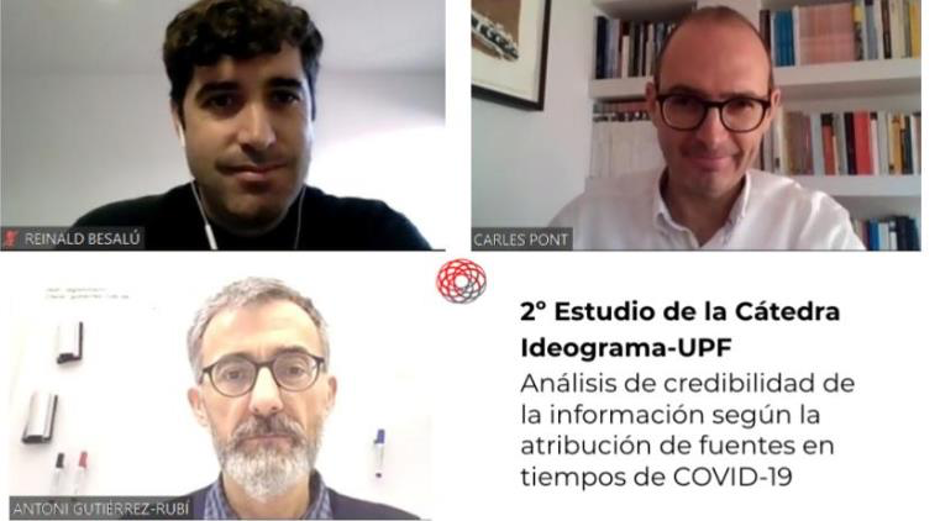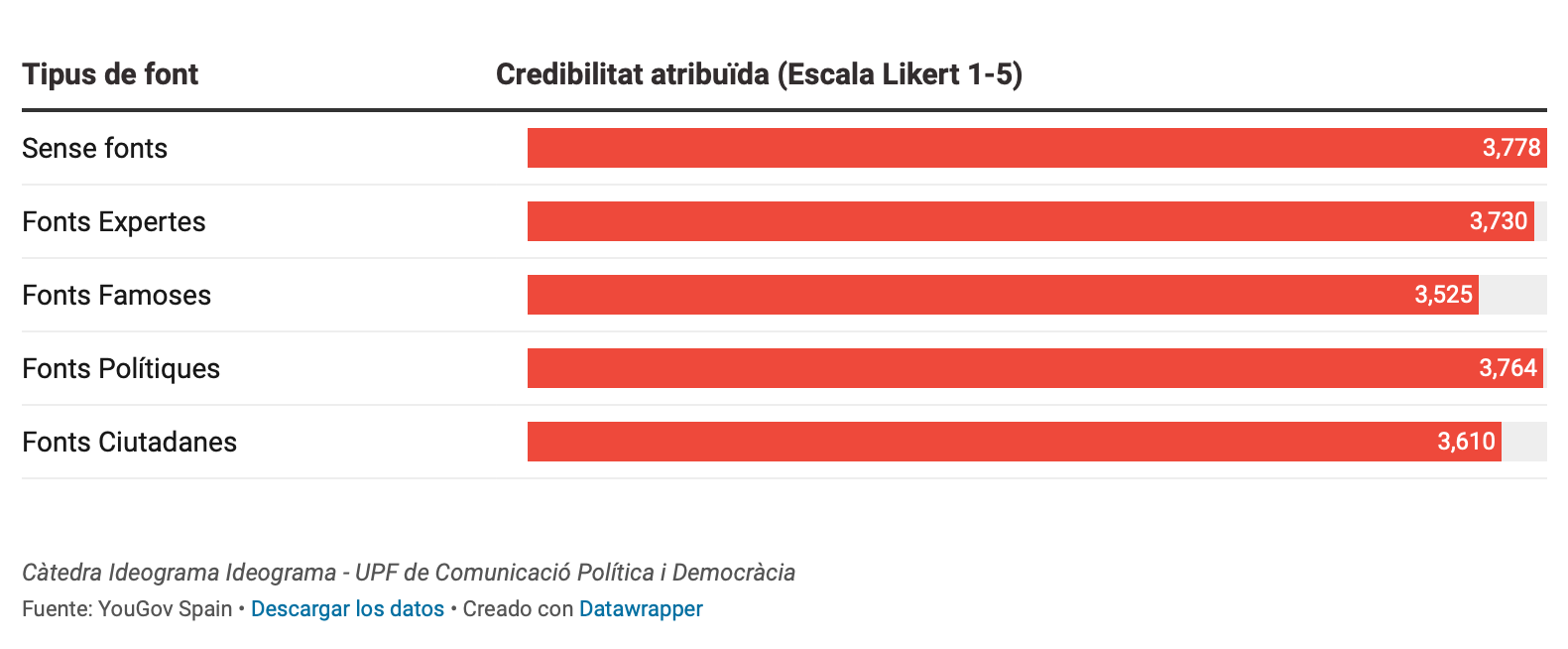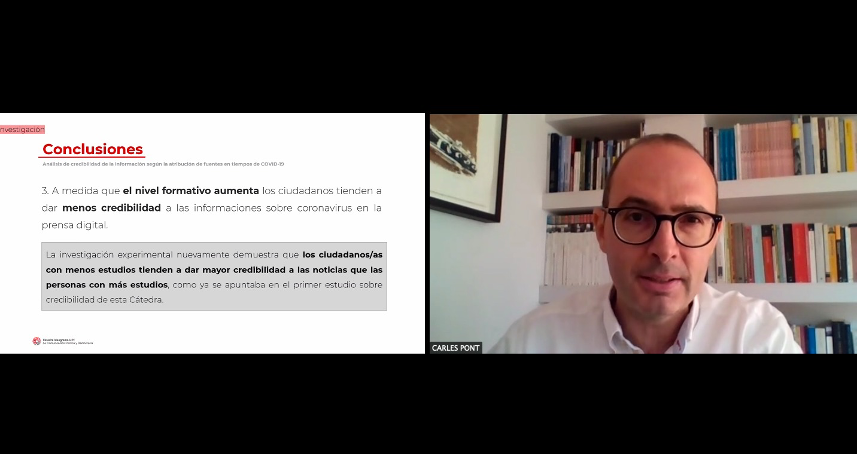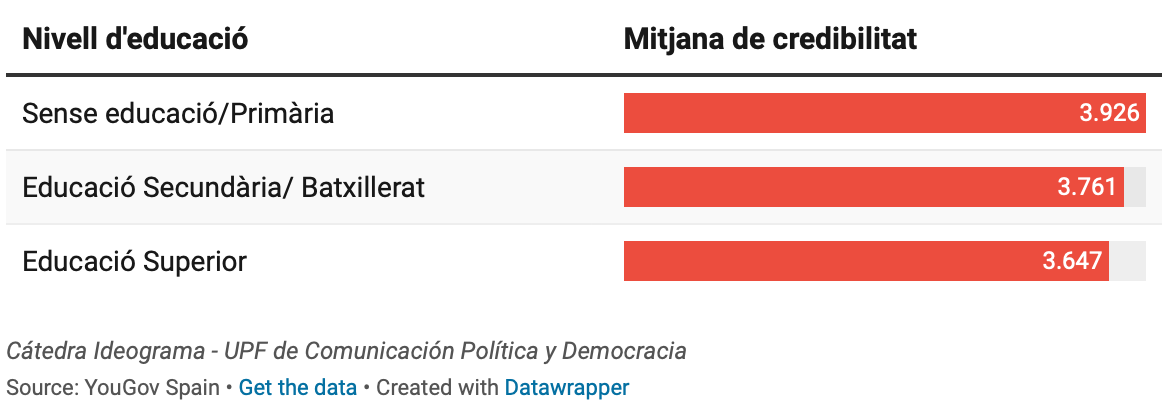2º Research of the Ideograma - UPF Chair: Analysis of credibility of the information according to the attribution of sources in time of COVID-19
2º Research of the Ideograma - UPF Chair: Analysis of credibility of the information according to the attribution of sources in time of COVID-19
2º Research of the Ideograma - UPF Chair: Analysis of credibility of the information according to the attribution of sources in time of COVID-19
A new study by the Ideograma-UPF Chair in Political Communication and Democracy analyzes the effect of news sources on the credibility of a news story about Covid-19.
Ideogram-UPF Chair in Political Communication and Democracy has presented the results of the second study on credibility. This research entitled 2nd Research of the Ideograma - UPF Chair: Analysis of credibility of information according to the attribution of sources in time of COVID-19 has been carried out in collaboration with the demographic company YouGov Spain.

Presentació davant dels mitjans de comunicació.
Presented by Antoni Gutiérrez-Rubí, promoter of the Chair, Carles Pont-Sorribes, director of the Chair and Reinald Besalú, deputy director of the Chair. All three analyzed the effect that different news sources have on the credibility of Covid-19 news.
According to the results obtained by the researchers, expert sources and political sources do not imply an improvement in the credibility of the news about Covid-19, but they do not have a negative effect either. On the other hand, famous sources and citizen sources do have a clear negative effect on the credibility of a news story.
The study also draws other clear conclusions, such as that older people are more gullible with any kind of information and that as the educational level of citizens increases, they tend to give less credibility to news about coronavirus in digital press.
Results of credibility granted depending on the source (Likert Scale 1-5)

Antoni Gutiérrez-Rubí, promoter of the Chair, began the presentation by talking about the objectives and lines of action of the Chair and highlighting the different projects that have been carried out so far. He is followed by Reinald Besalú, who explained the research methodology and reviews the results of this new credibility report.

Carles Pont-Sorribes, director de la Càtedra, explicant les conclusions del estudio.
Carles Pont-Sorribes, director of the Chair, went directly to the conclusions of the study: «Although we did not expect it, citizens tend to perceive as more credible the news related to the Covid-19 without attribution of sources and as less credible those with famous and citizen sources».
Besalú adds: «With regard to age, there is a tendency to increase the perception of the credibility of the news as age also increases; and, in the case of the educational level, it is even clearer: a higher educational level implies a lower perception of credibility».
Results of credibility granted according level of education (Likert Scale 1 - 5)

Finally, Gutiérrez-Rubí highlighted the connection with the study carried out by the Chair in 2019: «The format and the header are decisive elements for the credibility of the information. The 2019 research showed us that the format was important and the current study teaches us the relevance of the headline, the medium where the news is offered. It is not so important who said it, but where he said it», referring to the similarities in the format between the fictional newspaper, created by the survey and other newspapers such as El País or La Vanguardia, among others.
The Chair will soon publish another report on the credibility of the information, this time focusing on the Twitter social network, where the context marked by the COVID-19 pandemic will continue to play a prominent role.
| The 2º Research of the Ideograma - UPF Chair: Analysis of the credibility of the information according to the attribution of sources in time of COVID-19 can be downloaded here. |